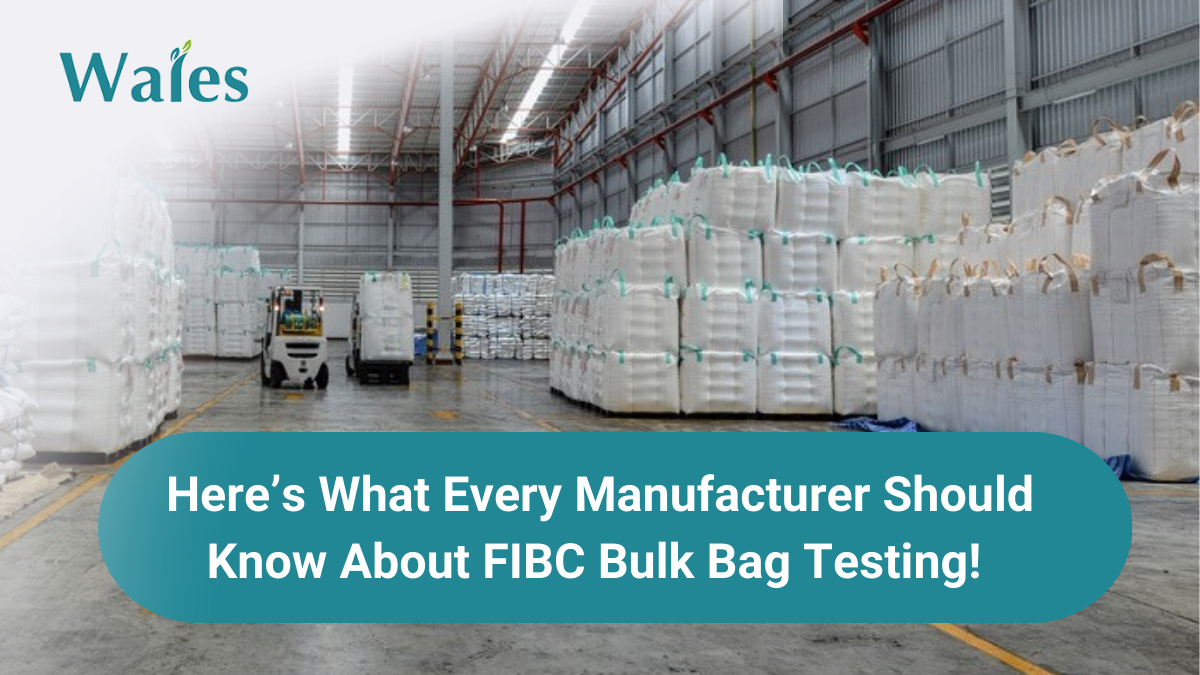
For every industry dealing with bulk quantities of material, whether it be their manufacturing hub or dispatch centre, FIBC bulk bags are essential. These bulk bags offer efficient, economical, and ecological solutions to store and transport bulk quantities with utmost ease and flexibility. From agricultural produce and the chemical industry to construction and pharmaceuticals, FIBC bulk bags are a go-to solution for all of your specific needs. However, the versatility of these bags can only be determined if they withstand external conditions without failing and by protecting the goods. This is where FIBC bulk bag testing comes into play.
In this article, we’ll discuss various aspects and components of FIBC bulk bag testing, compliance, quality assurance, and much more.
FIBC bulk bag testing may be a comprehensive preparation that looks at the quality, strength, and execution of bulk bags beneath a run of stressors. This testing guarantees that the bags can withstand the weight they’re outlined for and perform well beneath typical handling, capacity, and transport conditions. Other various aspects of the FIBC bulk bag testing are texture, lifting loops, filling and discharge spout options, and seams. These tests are basic for the assembly of both industry standards and the expectations of clients who depend on bulk bags for secure and productive fabric handling.
For ensuring the topmost quality of the bulk bags testing is essential. FIBC bulk bag testing procedure entails several types of tests for safety, performance, and quality assurance. A few of the several tests are as follows:
To ensure space optimization and stacked storage in warehouses or during transport, stacking tests are essential for FIBC bulk bags. This test is performed to determine the ability to withstand the pressure of other bags stacked on top of them. By ensuring that bags won’t collapse under pressure, the stacking test helps prevent product loss and other unnecessary accidents.
The drop test assesses a bag’s capacity to resist drops from an assigned stature. This test mimics scenarios where the bag could be dropped while dealing with, especially forklift operators. The FIBC bulk bags are dropped in several orientations to guarantee they can withstand stuns and impacts, reducing the hazard of item spillage.
The topple test surveys the soundness of the FIBC bulk bags, especially when stacked. This FIBC bulk bag test ensures that the bag maintains its structure even when it experiences a weight shift. This procedure easily eliminates the risks associated with to toppling of the bulk bags such as safety hazards, damage to the products, spilling risks, and more.
One of the main test procedures of the FIBC bulk bag testing is the righting test. This test evaluates the capacity of the bag to return to its upright position whenever it gets tilted or lifted. It’s especially valuable for bags that are handled in challenging or unpleasant conditions because it affirms the bag’s solidness and capacity to recapture its balance.
The tear test decides how well the FIBC bulk bags can withstand the potential tears and abrasions. This can be vital because minor damages amid travel or dealing can heighten, driving to pack burst. Testing for tear resistance helps ensure that the texture of the FIBC bulk bag is strong and sturdy.
The vibration test in FIBC bulk bag testing checks the bag’s flexibility against delayed vibrations, ordinarily experienced amid transportation by truck or train. This test guarantees that the bag can hold its content without losing its auxiliary integrity, even when subjected to continuous development.
Each of the FIBC bulk bag testing procedures plays an imperative part in guaranteeing the toughness and unwavering quality of FIBC bulk bags, particularly when they are entrusted with handling heavy and sometimes hazardous materials. Passing these tests implies that the bags are secure for use across various businesses and transportation strategies.
Australian Standard And Compliance For FIBC Bulk Bag
FIBC bulk bags undergo stringent testing procedures as well as Australian standard AS 3668-1989 and compliance tests.
Quality assurance is one of the crucial aspects of FIBC bulk bag protection. Manufacturers like Wales Industries practise a range of QA tests to ensure that the bag meets the required standards before it reaches the end customer. A few of the strategies include:
To select the right bag one needs to have a firm knowledge regarding the FIBC bulk bag testing procedures. The procedure of selecting the right FIBC bulk bag for your industrial requirements involves understanding the testing procedures, standards, and quality assurance. FIBC bulk bags that have undergone all the required tests and compliances are of the top quality offering greater resilience, durability, ease of handling, eco-friendliness, and many more benefits.
The safety factor of a FIBC bulk bag refers to its strength compared to the safe working load (SWL). Most FIBCs are designed with a safety factor of 5:1 or 6:1, meaning that they can handle up to five or six times their SWL during testing.
Choosing Wales Industries as your FIBC bulk bag manufacturer means choosing bags that meet stringent quality standards and industrial standards. Get in touch with Wales Industries to explore more about FIBC bulk bag testing.